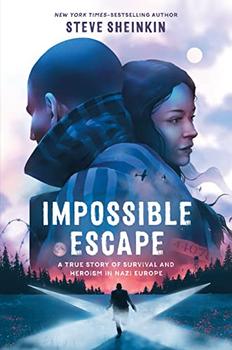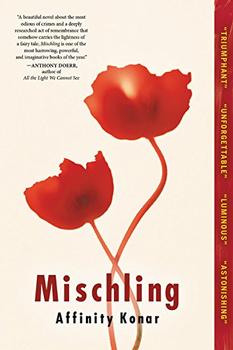Summary | Excerpt | Reading Guide | Reviews | Beyond the book | Read-Alikes | Genres & Themes | Author Bio

A tour de force historical mystery from Monica Hesse, the bestselling and award-winning author of Girl in the Blue Coat.
Germany, 1945. The soldiers who liberated the Gross-Rosen concentration camp said the war was over, but nothing feels over to eighteen-year-old Zofia Lederman. Her body has barely begun to heal; her mind feels broken. And her life is completely shattered: Three years ago, she and her younger brother, Abek, were the only members of their family to be sent to the right, away from the gas chambers of Auschwitz-Birkenau. Everyone else--her parents, her grandmother, radiant Aunt Maja--they went left.
Zofia's last words to her brother were a promise: Abek to Zofia, A to Z. When I find you again, we will fill our alphabet. Now her journey to fulfill that vow takes her through Poland and Germany, and into a displaced persons camp where everyone she meets is trying to piece together a future from a painful past: Miriam, desperately searching for the twin she was separated from after they survived medical experimentation. Breine, a former heiress, who now longs only for a simple wedding with her new fiancé. And Josef, who guards his past behind a wall of secrets, and is beautiful and strange and magnetic all at once.
But the deeper Zofia digs, the more impossible her search seems. How can she find one boy in a sea of the missing? In the rubble of a broken continent, Zofia must delve into a mystery whose answers could break her--or help her rebuild her world.
The concept of nothingness emerges as a deep wound and a pervasive trauma that weaves itself through every aspect of the characters' lives. Rather than being overwrought as a theme or device, this series of nothings underscores the morass of desolation that the characters have to navigate. Because of it, readers are drawn deeper into the emotional core of the novel, deeper into the questions raised by the horrors of a post-Holocaust world. True to the weight of its subject matter, They Went Left raises many questions that it does not answer; perhaps because there are no simple or absolute answers. The novel makes no claims to definitive truth about love and grief and survival, and therein lies much of its beauty and imaginative significance for readers...continued
Full Review
(803 words)
This review is available to non-members for a limited time. For full access,
become a member today.
(Reviewed by Debbie Morrison).
 The Red Cross is one of the aid organizations that plays a role in Monica Hesse's novel, They Went Left. Because so much of Europe was decimated after the war — phone service and many railways had been largely disrupted, for example — the Red Cross provided more than just medical care to Holocaust survivors, wounded soldiers and others affected by the war, it also served an important role in reconnecting family members. When we first meet Zofia, the protagonist of the novel, she is standing in a Red Cross line, waiting to give her brother's name so that a record of his "missing" status can be logged and the official search for him can begin.
The Red Cross is one of the aid organizations that plays a role in Monica Hesse's novel, They Went Left. Because so much of Europe was decimated after the war — phone service and many railways had been largely disrupted, for example — the Red Cross provided more than just medical care to Holocaust survivors, wounded soldiers and others affected by the war, it also served an important role in reconnecting family members. When we first meet Zofia, the protagonist of the novel, she is standing in a Red Cross line, waiting to give her brother's name so that a record of his "missing" status can be logged and the official search for him can begin.
Zofia displays an implied mistrust of the large bureaucracy's ability to find her ...
This "beyond the book" feature is available to non-members for a limited time. Join today for full access.

If you liked They Went Left, try these:

by Steve Sheinkin
Published 2023
From three-time National Book Award finalist and Newbery Honor author Steve Sheinkin, a true story of two Jewish teenagers racing against time during the Holocaust - one in hiding in Hungary, and the other in Auschwitz, plotting escape.

by Affinity Konar
Published 2017
"One of the most harrowing, powerful, and imaginative books of the year" (Anthony Doerr) about twin sisters fighting to survive the evils of World War II.